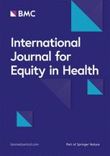Leaving no one behind? Social inclusion of health insurance in low- and middle-income countries: a systematic review
 One way to achieve universal health coverage (UHC) in low- and middle-income countries (LMIC) is the implementation of health insurance schemes. A robust and up-to-date overview of empirical evidence assessing and substantiating health equity impact of health insurance schemes among specific vulnerable populations in LMICs beyond the more common parameters, such as income level, is lacking. The authors fill this gap by conducting a systematic review of how social inclusion affects access to equitable health financing arrangements in LMIC. They searched 11 databases to identify peer-reviewed studies published in English between January 1995 and January 2018 that addressed the enrolment and impact of health insurance in LMIC for the following vulnerable groups: female-headed households, children with special needs, older adults, youth, ethnic minorities, migrants, and those with a disability or chronic illness.
One way to achieve universal health coverage (UHC) in low- and middle-income countries (LMIC) is the implementation of health insurance schemes. A robust and up-to-date overview of empirical evidence assessing and substantiating health equity impact of health insurance schemes among specific vulnerable populations in LMICs beyond the more common parameters, such as income level, is lacking. The authors fill this gap by conducting a systematic review of how social inclusion affects access to equitable health financing arrangements in LMIC. They searched 11 databases to identify peer-reviewed studies published in English between January 1995 and January 2018 that addressed the enrolment and impact of health insurance in LMIC for the following vulnerable groups: female-headed households, children with special needs, older adults, youth, ethnic minorities, migrants, and those with a disability or chronic illness.
The comprehensive database search resulted in 44 studies. In general, health insurance schemes seemed to prevent catastrophic health expenditures to a certain extent. However, despite a sizeable literature published on health insurance, there is a dearth of good quality evidence, especially on equity and the inclusion of specific vulnerable groups in LMIC. Evidence should be strengthened within health care reform to achieve UHC, by redefining and assessing vulnerability as a multidimensional process and the investigation of mechanisms that are more context specific.
This article appeared in International Journal for Equity in Health. Read the full text.
Author(s) / editor(s)
About the author(s) / editor(s)
Suzanne van Hees and Ernst Spaan are affliated to the Radboud Institute for Health Sciences (RIHS).
Timothy O'Fallon, Sarah Polack and Lena Morgon Banks are affiliated to the International Centre for Evidence in Disability, London School of Hygiene and Tropical Medicine.
Miranda Hofker is affiliated to VU University Amsterdam.
Marleen Dekker is Professor of Inclusive Development in Africa at Leiden University.

